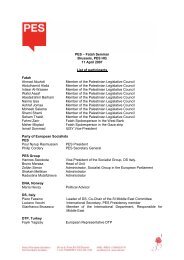Hedge funds and Private Equity - PES
Hedge funds and Private Equity - PES
Hedge funds and Private Equity - PES
You also want an ePaper? Increase the reach of your titles
YUMPU automatically turns print PDFs into web optimized ePapers that Google loves.
3.4 Company law <strong>and</strong> corporate governance (shareholders rights)<br />
In the fields of company law <strong>and</strong> corporate governance, the EU objectives include: providing<br />
equivalent protection for shareholders <strong>and</strong> other parties concerned with companies; ensuring<br />
freedom of establishment for companies throughout the EU; fostering efficiency <strong>and</strong> competitiveness<br />
of business; promoting cross-border cooperation between companies in different<br />
Member States; <strong>and</strong> stimulating discussions between Member States on the modernisation of<br />
company law <strong>and</strong> corporate governance.<br />
Here a long list of directives has been adopted ranging from the formation of public limited<br />
liability companies <strong>and</strong> the maintenance <strong>and</strong> alteration of their capital (Directive 2006/68/EC) to<br />
cross-border mergers of limited liability companies (Directive 2005/56/EC), takeover bids<br />
(Directive 2004/25/EC), disclosure requirements in respect of certain types of companies<br />
(Directive 2003/58/EC), <strong>and</strong> Directive 2001/86/EC supplementing the Statute for a European<br />
company with regard to the involvement of employees. A Directive regulating shareholders voting<br />
rights is currently under scrutiny by both EU legislators <strong>and</strong> a debate is taking place on whether<br />
one share should mean one vote.<br />
The Take-over Directive applies to takeover bids for the securities of a company governed<br />
by the law of a Member State if those securities are admitted to trading on a regulated<br />
market in one or more Member States. The scope of the companies <strong>and</strong> merger transactions<br />
covered by Directive is narrow. However, Member States can choose to regulate<br />
a wider range of companies <strong>and</strong> merger transactions if they want to.<br />
The general principles in the Directive are:<br />
All holders of the securities of an offeree company of the same class must be given<br />
equal treatment – in particular, if a person acquires control of a company, the other<br />
holders of securities must be protected.<br />
Holder of securities in an offeree company must have sufficient time <strong>and</strong> information<br />
to enable them to react a properly informed decision on the bid – the board of the<br />
offeree company must give its views on the effects of the bid on employment, conditions<br />
of employment <strong>and</strong> the company’s business locations.<br />
The board of the offeree company must act in the interest of the company as a whole,<br />
<strong>and</strong> must not deny the holders of securities the opportunity to decide on the merits of<br />
the bid.<br />
False markets must not be created in the securities of the offeree company, the offeror<br />
company or any other company concerned by the bid in such a way that rise or fall in<br />
the prices of the securities becomes artificial <strong>and</strong> the normal functioning of the market<br />
is distorted.<br />
An offeror may only announce after ensuring that it can fulfil in full any cash consideration<br />
it offers <strong>and</strong> after having taken all responsible measures to secure the<br />
implementation of any other type of consideration.<br />
Offeree companies must be hindered in the conduct of their affairs for longer than<br />
responsible by a bid for their securities.<br />
Part I – <strong>Hedge</strong> <strong>funds</strong> <strong>and</strong> private equity <strong>funds</strong> – how they work<br />
89




